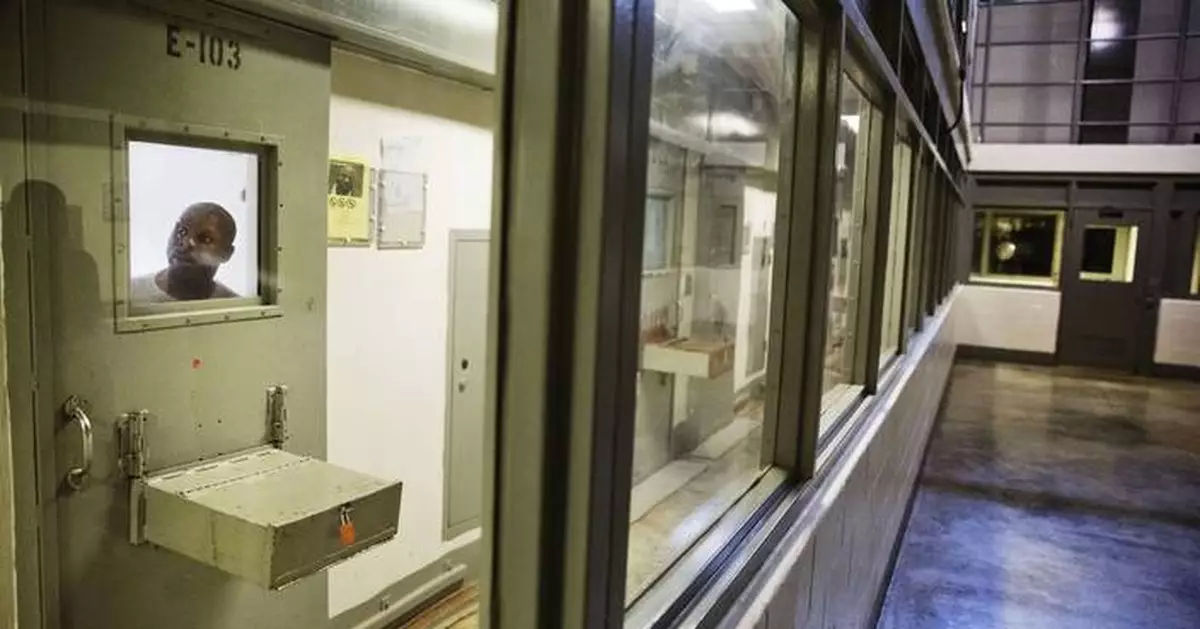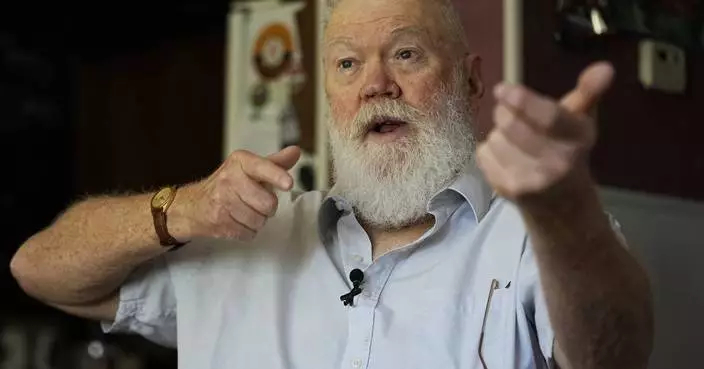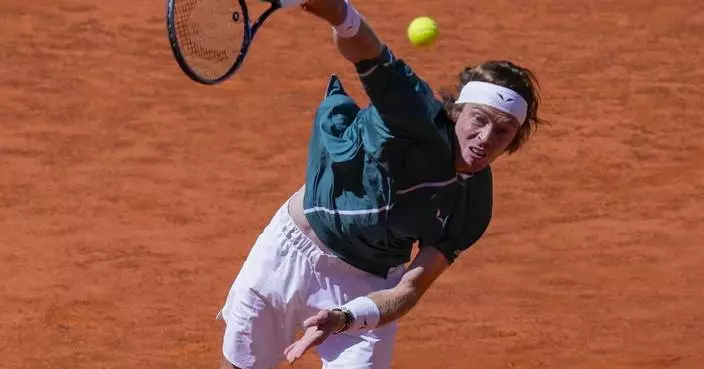ATLANTA (AP) — Georgia prison officials have flagrantly violated a court order to reform conditions for prisoners in the state's most restrictive holding facility, showing “no desire or intention" to make the required changes to solitary confinement practices, a federal judge said.
In a damning ruling, U.S. District Judge Marc Treadwell on Friday held officials at the Georgia Department of Corrections in contempt, threatening them with fines and ordering an independent monitor to ensure compliance with a settlement agreement for the Special Management Unit of the Georgia Diagnostic and Classification Prison in Jackson, about 50 miles (80km) south of Atlanta.
The SMU houses some of the state's most violent offenders in solitary confinement under conditions that one expert found risked causing psychological harm.
“Despite clear and unambiguous directives aimed at improving conditions and procedural safeguards at the SMU, the defendants have failed to implement reforms that were agreed upon by the parties and ordered by the Court, thereby negating the required relief,” Treadwell wrote.
He accused prison officials of falsifying documents and said they routinely placed new arrivals at the facility in “strip cells,” where one inmate said he was not given clothes or a mattress and could not use the toilet because it was broken and filled with human waste.
A spokesperson for the state department of corrections, Joan Heath, said in an email it will not be commenting on legal matters.
The settlement agreement stemmed from a 2015 lawsuit by Timothy Gumm, an inmate at the SMU serving a life sentence for rape. In the most restrictive wings, prisoners remained locked in their cells alone 24 hours a day, five to seven days a week, and weren’t allowed to have books or other distractions, lawyers for Gumm and other inmates said.
A psychology professor and prison expert told the court he had toured maximum security prisons in roughly two dozen states, and Georgia's SMU unit was “one of the harshest and most draconian” he had seen.
Craig Haney's report — submitted to the court in 2018 by lawyers for prisoners — included images of prisoners with self-inflicted cuts, blood on the floor of one cell and the window of another, and descriptions of “extraordinarily harsh” living conditions. His conclusion: “The prisoners at this facility face a substantial risk of serious harm, harm that may be long-lasting and even fatal.”
The settlement agreement the court approved in 2019 required prison officials to allow prisoners out of their cells at least four hours each weekday, give them access to educational programming and materials, and keep their cells clean, among other changes.
In his order on Friday, Treadwell said the plaintiffs presented “overwhelming evidence” that inmates remained in their cells between 22 and 24 hours a day and did not receive the required minimum of at least two hours a week of classroom time. They were also not given weekly access to a book cart, library or computer tablet as required, among numerous other violations, the judge said.
He called the violations “longstanding and flagrant.”
Georgia's prisons also face scrutiny from the U.S. Justice Department, which announced in 2021 it was launching a civil rights probe of the system.

FILE - An inmate looks out of his cell in the the Special Management Unit, known as high-max at the Georgia Diagnostic and Classification Prison, Dec. 1, 2015, in Jackson, Ga. The Special Management Unit of the Georgia Diagnostic and Classification Prison houses some of the state’s most violent offenders. In a damning ruling, U.S. District Judge Marc Treadwell said Friday, April 19, 2024, that prison officials showed no desire or intention to make the required changes to SMU's solitary confinement practices. (AP Photo/David Goldman, File)
BRUSSELS (AP) — Germany on Friday accused Russian military agents of hacking the top echelons of Chancellor Olaf Scholz’s party and other sensitive government and industrial targets, and was joined by NATO and fellow European countries in warning that Russia’s cyberespionage would have consequences.
Relations between Russia and Germany were already tense, with Germany providing military support to Ukraine in its ongoing war with Russia.
German Foreign Minister Annalena Baerbock said Russian military cyber operators were behind the hacking of emails of the Social Democrats, the leading party in the governing coalition. Officials said they did so by exploiting Microsoft Outlook.
Officials described a hacking campaign that persisted for months.
The German Interior Ministry said in a statement that the hacking campaign began at least as early as March 2022 — a month after Russia's full-scale invasion of Ukraine — with emails at Social Democrat party headquarters accessed beginning that December. It said German companies, including in the defense and aerospace sectors, as well as targets related to the war were also a focus.
The statement said international efforts led by the FBI shut down in late January a botnet of compromised network devices used by the Russian hackers — known as APT28 or Fancy Bear — in the cyberespionage scheme.
“Russian state hackers attacked Germany in cyberspace,” Baerbock said at a news conference in the Australian city of Adelaide. She attributed the hack to a unit of Russia's GRU military intelligence unit.
“This is absolutely intolerable and unacceptable and will have consequences,” she said, without specifying what they might be.
A separate German statement said the hacking occurred over “a relatively long period” and also targeted various unidentified German government authorities, foundations and associations. It said the Social Democrats' executive committee was targeted.
The Council of the EU and the Czech Foreign Ministry said Czechia's institutions have also been targeted by the same group. Both German and Czech officials said the GRU hackers leveraged a previously unknown vulnerability in Microsoft Outlook.
In a statement by the EU’s top diplomat, Josep Borrell, the bloc’s nations said they “strongly condemn the malicious cyber campaign" by Fancy Bear "against Germany and Czechia.”
The EU noted that it had previously imposed sanctions on individuals and entities associated with the group for targeting the German parliament in 2015. It said it will not tolerate the continuation of such attacks, particularly with EU elections upcoming in June.
NATO accused Fancy Bear of targeting “other national governmental entities, critical infrastructure operators and other entities across the Alliance," including in Lithuania, Poland, Slovakia and Sweden.
“We are determined to employ the necessary capabilities in order to deter, defend against and counter the full spectrum of cyberthreats to support each other, including by considering coordinated responses,” said the North Atlantic Council, the principal political decision-making body within NATO.
Baerbock is visiting Australia, New Zealand and Fiji, with the trip focusing on security policy as China pushes for influence in the Pacific region.
“The defense cooperation between Germany and Australia is close and we would like to deepen it further and together expand it, because we are in a situation where we face similar threats,” said Baerbock, who is the first German foreign minister to visit Australia in 13 years.
Discussions between Baerbock and Australia counterpart Penny Wong centered on the conflict in Gaza. “I think we all understand that the only path out of this cycle of violence that we see in the Middle East at such great cost is one that ultimately ensures a two-state solution,” Wong said.
Associated Press Technology writer Frank Bajak in Boston, Karel Janicek in Prague, Stephen Graham in Berlin, Samuel Petrequin in Brussels and Foster Klug contributed to this report.

Germany's Minister for Foreign Affairs Annalena Baerbock, left, speaks with Lewis O'Brien, the oldest living Kaurna man, in Adelaide, Friday, May 3, 2024, during a ceremony to mark the return of four significant cultural heritage items to the Kaurna people from the collection of the Grassi Museum in Leipzig. (Michael Errey/Pool Photo via AP)

Germany's Foreign Minister Annalena Baerbock, center, poses with Lewis O'Brien, the oldest living Kaurna man, and Australian Foreign Minister Penny Wong, left, in Adelaide, Friday, May 3, 2024, during a ceremony to mark the return of four significant cultural heritage items to the Kaurna people from the collection of the Grassi Museum in Leipzig. (Michael Errey/Pool Photo via AP)

Germany's Foreign Minister Annalena Baerbock, left, and Australian Foreign Minister Penny Wong arrive for a news conference in Adelaide, Friday, May 3, 2024. (Michael Errey/Pool Photo via AP)

Germany's Foreign Minister Annalena Baerbock, left, and Australian Foreign Minister Penny Wong attend a news conference in Adelaide, Friday, May 3, 2024. (Michael Errey/Pool Photo via AP)

Germany's Foreign Minister Annalena Baerbock speaks in Adelaide, Friday, May 3, 2024, during a ceremony to mark the return of four significant cultural heritage items to the indigenous Kaurna people from the collection of the Grassi Museum in Leipzig. (Michael Errey/Pool Photo via AP)















